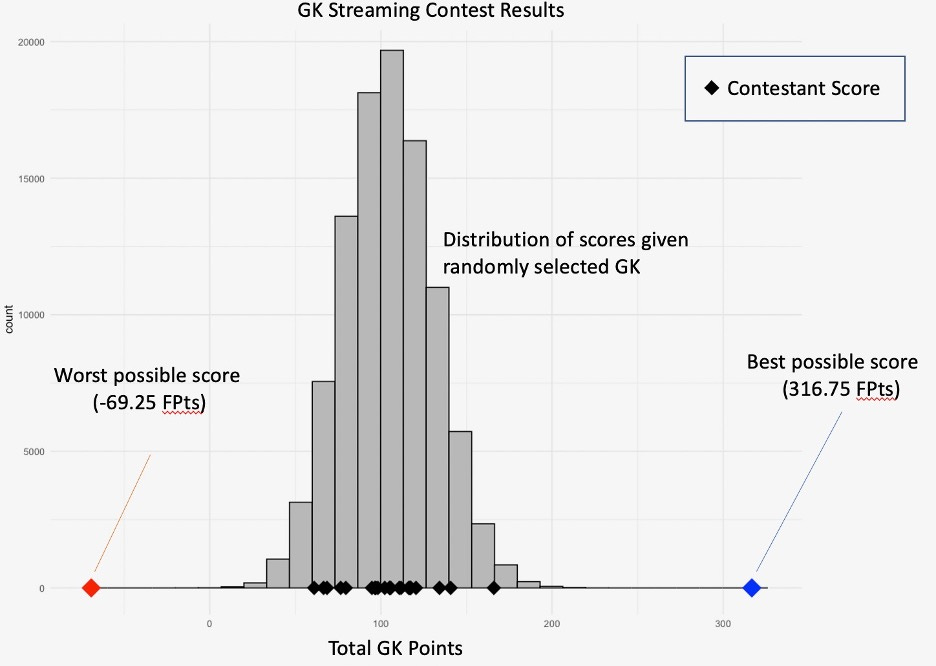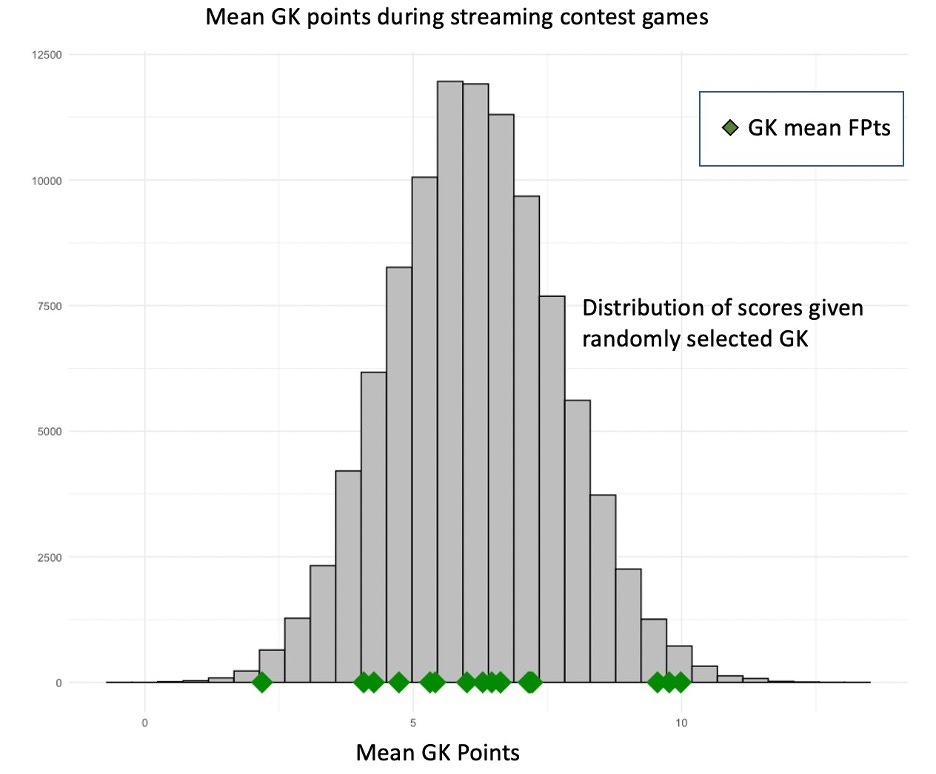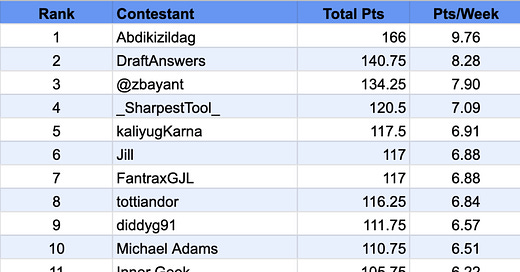Goalkeeper Value Part I: Streaming Success?
Anyone who grew up playing fantasy American football knows one of the game’s undisputed principles—you draft a kicker last. For one reason or another, goalkeepers have assumed a similar forgotten status in the Draft Premier League game. Yet, unlike kickers, goalkeepers do have the potential to score significant points in Fantrax scoring. This led us to wonder, are keepers worth more than the Community gives them credit for?
After some brainstorming (overthinking?), we came up with a few questions we wanted to answer:
Can managers effectively stream goalkeepers?
Are goalkeepers valuable at all, and if so, how valuable?
What should managers consider when selecting keepers?
We aim to tackle these questions in our three-part goalkeeper article series with some help from the Community and our own analyses. By the end, we hope to provide a little more clarity on the value of keepers and how you should think about them.
The Goalkeeper Streaming Challenge
As many of you know, for the last 21 game weeks of the 20/21 season, we hosted a goalkeeper streaming challenge involving many in the Community. The purpose of this challenge was to determine whether managers could effectively stream goalkeepers across the course of a season, as Community consensus appears to suggest. If streaming is an effective strategy, then it stands to reason that managers should not necessarily invest valuable draft capital in shot stoppers. Importantly, we wanted to give streamers every chance to succeed, so rather than streaming from a pool of waiver wire options—as one would during a real fantasy campaign—managers could pick from any keeper in the league. Top 6 stars? Breakout performers? All were on the table. If Community members could only achieve sub-part returns with the best keepers at their disposal, then streaming may not be as worthwhile an endeavor as we think.
It became pretty clear from the start that the 20/21 Goalkeeper Streaming Challenge was not much of a competition at all. While the Overthinking Football team held down the bottom of the table, one Community member, @abdikizildag, ran away with the title, fighting off some initial competition from Community favorite @DraftAnswers. @abdikizildag finished off with 9.76 points per game week using 10 different keepers throughout the challenge, a wide margin above the average score of 6.0 pts/week from the other competitors. But the question remained: had @abdikizildag and the other high-performers figured out the key to effective goalkeeper streaming, or were they just on the lucky side of a 21-week period? To assess this question, we first chatted with a few challenge contestants, trying to gain an understanding of the different strategies at play.
GK Streaming Strategies
Chasing Clean Sheets
One of the most popular strategies we observed was the practice of chasing clean sheets, or, in other words, picking a keeper facing one of the league’s weakest attacking sides. At an initial glance, this approach may be the most promising, as variations of it were used by our competition winner and runner-up @DraftAnswers. As described by @abdikizildag, he would generally look at the fixtures, highlight three or four teams that were the most likely to keep a clean sheet that week, and then attempt to pick the keeper of the team that was usually busiest in defense. @DraftAnswers’s approach was even simpler, targeting teams that were most unlikely to score (i.e., Sheffield United) and selecting the opposition keeper.
Given clean sheets’ outsized influence as a scoring category, selecting keepers with the most likely chance of not conceding makes sense. However, considering the ongoing profitability of the English betting markets, finding such keepers is easier said than done. Unsurprisingly, some of our other keeper challenge contestants tried a similar strategy with less success. For instance, @diddyg91 employed an opponent-dependent strategy on his way to ninth place in the competition, but only managed to put up an average of 6.57 points per week.
Stick with the Studs
Another strategy used by our streamers involved focusing in on the top performing keepers. In the 2020/21 season, these players were clear: Emi Martinez, Nick Pope, and Illan Meslier. By concentrating on these three standouts and selecting the one with the best matchup each week, @jillw_12 was able to secure a sixth-place finish, but again trailed our leader by just under 3 points per week. Even then, this strategy is not feasible in an actual Fantrax league, as it is unlikely that any of these stars would be available on the waiver wire for week-to-week streaming.
Saves, Saves, Saves
The final streaming approach we will highlight is perhaps the riskiest. Rather than seeking clean sheets or relying on solid defensive teams, managers can aim for keepers who have an opportunity to make the most saves in a given week, even if that means an increased likelihood of goals allowed. So, like the “chasing clean sheets” strategy detailed above, this approach is dependent on the opposing team, but instead of focusing on the opposing team least likely to score, managers select keepers playing the teams most likely to get shots on goal (e.g., Manchester City, Liverpool, Leeds, etc.).
While this approach has the potential to go very poorly, it may have the highest upside, should a lucky keeper not concede a handful of goals against their superior opposition. After falling behind early, Overthinking Football’s Andrew attempted a version of this strategy on the run-in, and let’s just say it could have gone better.
Can managers effectively stream goalkeepers?
Now that we have discussed a few of the various keeper strategies and highlighted the performances of some of our top challenge competitors, it’s time to answer our first question: can managers effectively stream goalkeepers?
While we had the results from our goalkeeper challenge managers, we needed to place them in context. Sure, @abdikizildag appears to be a streaming wizard and the Overthinking Football crew should never be trusted to pick a keeper to save their lives, but how do fantasy managers’ streaming choices stack up against randomly drawing a keeper out of a hat each week? One of our challenge participants, @FantraxGJL, had a similar idea, and actually randomly selected his keeper throughout the competition on his way to a tie for 6thplace and a 6.88 pts/game week average. But to get a true sense of our challenge participants’ streaming performance, we needed a much larger random sample size than Gordon’s single entry. Since we sadly didn’t have thousands of Gordons to pick keepers for us, we ran simulations instead. We generated 10,000 bot managers (AKA Random Number Generator FC) who randomly selected a goalkeeper for each week of the contest. This allowed us to see the range of outcomes you could realistically expect with a random strategy. The resulting distribution of these simulations is plotted in Figure 1 below, along with the theoretical maximum and minimum achievable scores, and the contestant scores.

As shown in Figure 1, the best possible score a manager could have obtained in the Goalkeeper Streaming Challenge was 316.75 points, while the worst was an impressively bad -69.25. The histogram in the figure represents the distribution of total points scored by Random Number Generator FC simulated keeper selections. In other words, this is the distribution of points you’d expect to see if you selected a keeper randomly each week. On average, Random Number Generator FC was expected to finish the challenge with a little over 100 total points. Outcomes at the extremes were not impossible, but were significantly less common.
The black diamonds in Figure 1 represent the final point totals of our twenty-three Goalkeeper Streaming Challenge contestants. Remarkably, the Challenge contestants’ results almost perfectly mirror the randomly simulated distribution. Outside of our winner, a majority of managers were clustered within the most likely outcomes, indicating that randomizing one’s keeper selections would likely have been just as successful as trying to pick and choose the best keeper each week.
We must admit, when we started this experiment we figured this might be the outcome. But even we were a bit shocked at how perfectly the challenge results fit into the randomized distribution. We as managers have a tendency to overestimate our ability to beat the mean, and we thought that streaming keepers could not be that hard. But, despite seemingly widespread Community agreement that streaming keepers is an effective strategy, it turns out that out-streaming random selection is not only difficult, but is probably very unlikely.
A Simpler Approach
Finding out that you might as well be randomly choosing your keepers is a bit of a shot to the managerial ego, but, if anything, it just supports the decision to ignore keepers as draft fantasy assets. Yet before writing off keepers entirely, we wanted to check to see if there were other strategies for keepers that would have produced better than random results. Naturally, we turned to the strategy opposite of streaming: sticking with one keeper regardless of matchup. Figure 3, below, plots the various individual Premier League keepers on a random distribution of mean goalkeeper points per match during the 21-week window in which we ran the Streaming Challenge.

The mean points of the various Premier League goalkeepers again mirrored the randomized normal distribution of mean keeper points. This suggests that picking a random Premier League goalkeeper and sticking with them, regardless of matchup, would likely have returned results close to those a manager would have seen if randomly selecting a keeper each week. It also suggests that, for most Streaming Challenge participants, picking and sticking with one keeper would have produced similar, if not maybe a little better results. Our median performer, the FF Chaps (6.19 pts/week), had a lower mean score than 11 of the 18 Premier League keepers who amassed 10 starts during the Challenge period. Even our runaway leader would have improved his 9.76 pts/week performance by sticking with either Sam Johnstone (9.98 pts/week) or Alisson (9.77 pts/week) throughout the Challenge.
Ultimately, the data shows that sticking with one random keeper is not necessarily much better than attempting to stream keepers or picking a name out of a hat each week. Yet the strategy of sticking with a single keeper did produce more results on the higher end of the random distribution relative to our Streaming Challenge contestants. Given the small sample size of the Challenge period, one should be wary to read too much into these results, but there is a chance that managers may be better off saving their energy rather than switching goalkeepers week-to-week.
So what’s the point?
If we learned anything from the Goalkeeper Challenge, it is that streaming keepers is TOUGH. A few Community members proved themselves to be streaming savants relative to their peers, but even they failed to produce results outside of what we might reasonably expect from random selection. As a consequence, it is tempting to discount the process of selecting keepers altogether. But just because it is very hard to predict week-to-week goalkeeper performances does not mean that keepers hold no value. In fact, if our previous Wins Above Replacement (WAR) analyses have showed anything, it’s that incremental increases in performance can go a long way within positional groups with fewer standout performers. Part II of our goalkeeper article series will unveil our goalkeeper WAR for the 20/21 season, providing a first look at keepers’ value relative to their outfielder peers!





